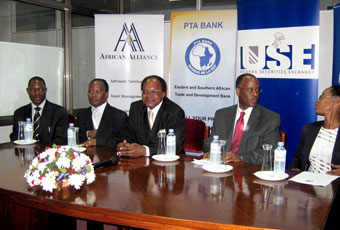
By Patrick Kagenda & Joshua Masinde
The year 2009 began with projections of declining economic growth especially in Sub- Saharan Africa as a result of the global financial meltdown. Growth was projected to decline from 7 percent in 2007 to 6 percent in the financial year 2008/09.
The economy has shown resilience in the face of the global recession and according to the International Monetary Fund (IMF) it will register a growth rate of 7.0% in 2009 compared to the 9 percent in 2008.
International ratings agency Standard and Poor upgraded Uganda`s sovereign rating to B+ with stable outlook.
Earlier in the year, the economy witnessed a huge shortage of dollars as remittances reduced and offshore investors fled the market. At one point up to US$15 million (Shs2.9 billion) was being sucked out of the economy daily. This resulted in inflation going up to the 15 percent mark. By mid-year dollars begun to trickle back in and by year-end the shilling was set for a 5 percent gain against the dollar according to a forecast by Standard bank group.
Inflation

According to the Uganda Bureau of Statistics (UBOS), the inflation rate for the year ending November 2009 dropped to 12 per cent from 13.4 percent in October, a condition blamed on high food prices. This was a sign that the double digit inflation the country has experienced for the last seventeen months could drop to single digit, but does not signal a reduction in the prices of goods, which have remained high. However, UBOS figures indicated that annual food crop inflation for the year ending November 2009 decreased to 35.5 per cent from 39 per cent in October. The overall index in food driven inflation fell from 26.4 percent to 22.6 percent. UBOS also indicated that food prices had reduced by 0.5 per cent due to significant reductions in prices of most fresh vegetables, beans, chickens, fish and milk.
Remittances
Remittances from Ugandans abroad increased to $1b (about Shs 1.8 trillion) this year from US$748 million last financial year. Such remittances were sent by Ugandans from countries like in USA, China, Japan and Iraq among other countries.
A parliamentary report, in October this year, showed foreign direct investment (FDI) in the country had slightly slumped by 5.4 per cent (US$ 736.4 million) in 2008/09 as compared to the financial year 2007/08.
Energy

Minister Hillary Onek promised a major shake-up when he was appointed and in October instituted a commission of inquiry into the sector that unearthed Shs 452billion as government loss into the Umeme. Onek, however, has not delivered on either reduced tariffs or the end of load-shedding.
The US$860 million, 250 megawatt Bujagali hydro-electric power project on the river Nile started the year on full throttle and continued to progress beyond schedule through-out the year. By year end up to 50 percent of the power house and switch yard was complete. Problems remained, however, on the transmission line works from Jinja-Mukono-Kampala that were being blocked by residents over compensation wrangles.
Transport
Poor performing Kenya “Uganda railway concessionaire, Rift Valley Railways survived another year despite Transport minister John Nasasira`s threats. Uganda and Kenya were set to construct a high capacity and speed standard gauge US$500 million railway but both governments are still stuck with the concession over legal implications.
Oil

Tullow oil raised US$402 million (Shs 1.2 trillion) for investment in its oil explorations in the Albertine region where it struck the biggest oil well in Sub-Sahara Africa in Amuru district in northern Uganda. Tullow believes the Amuru wells contain over 300 million barrels although they could be as high as 600million barrels. In May Tullow said it had encountered good quality oil in its Nsonga -1 exploration well. In spite of the continued oil finds the company is facing infrastructure challenges of how to develop the oil discovered and bring it to the world markets from the remote region. By year end, Aidan Heavey the Tullow oil Uganda Chief was saying that the company had lined up 10 companies that had pre-qualified for the bidding.
However, it is Heritage Oil Plc that staged the coup of the year when it negotiated the sale of its Uganda assets to Italian oil giant ENI for US$1.35 billion towards the end of the year. Tullow which holds a 50% stake in the assets said it would exercise its right of pre-emption but the government said it was backing ENI. 2010 will tell how that goes.
Capital
National Social Security Fund, the top-source of local long-term capital failed to return to trading at the Uganda Securities Exchange although the ministry of Finance lifted the suspension it imposed over the 2008 Temangalo scandal in which land worth Shs 11 billion was controversially bought from Defense minister Amama Mbabazi.
But the bourse thrived, especially in the third quarter of 2009 as the economy began picking up from the aftershock effects of the global financial meltdown. Stanbic Bank led the rally when it issued a Shs 30 billion bond to finance its expansion programme in August. Although it was under-subscribed it was a major success amid tight liquidity. Housing Finance bank and the Eastern and Southern Africa Trade Development bank (PTA) followed with issues of Shs18 billion and Shs40 billion bonds. They both performed averagely. Then MTN entered the marketed with a novelty; a syndicated $100 million. The Central Bank continued to trade in Treasury Bills and other commercial paper capping in November with the issue of a Shs 60 billion bond that was oversubscribed by Shs102 billion.
Mortgages

In November, Stanbic Bank and National Housing and Construction Corporation partnered in a mega-mortgage deal involving an estate with 144 units and others. The deal capped a year in which mortgages, initiated by Stanbic Bank, Housing Finance Bank, Post Bank, and a host of other commercial banks went hit the main street. Big-time mortgage financing, however, remains targeted at a clientele that is not of the ordinary Ugandan but those in the Diaspora as the houses range between US$ 80,000-$220,000 (Shs 150- 426 million).
Corporate
The company that came in suddenly went out in a storm as Uganda’s only public victim of the global financial credit crunch. Gateway Television’s launch in 2008 shattered DSTV’s monopoly, forced down prices, and signed a five year US$ 5.8 million sponsorship of Uganda’s football premier league. However, the firm’s January press release, after stopping all its transmissions, left more than 45 employees jobless, and its customers devastated.
Construction

Uganda Clays opened its Shs 26 billion factory in Kamonkoli in Budaka district in Eastern Uganda. The opening of the factory was initially delayed because of the political turmoil that hit Kenya affecting the supply of equipment from Mombasa. The factory was financed by the east African Development Bank.
Regional integration
The East African Community (EAC) marked 10 years’ existence, with the signing of the EAC Common Market Protocol in Arusha on 20 by the five heads of state from member countries, Yoweri K. Museveni (Uganda), Mwai Kibaki (Kenya), Jakaya Kikwete (Tanzania), Paul Kagame (Rwanda) and Pierre Nkurunziza (Burundi). The protocol is expected to come into force in July 2010. It will allow free movement of people, goods, services and labour in the region. It is a crucial part toward the anticipated political federation of the member countries by 2015, and coming up with a harmonised monetary union by 2012. This is also expected to increase the volume of regional trade, more foreign investment and enhanced regional competitiveness, thanks to its more than 120 million people.
Banking

In February Barclays Bank Uganda, a subsidiary of UK-based Barclays Bank PLC, was in the news for the wrong reasons. Soon alarmed customers flocked to withdraw their savings. But it braved the tide and the Central Bank weighed in with an official statement reassuring the public of Barclays Bank’s solvency.
The Central Bank also had to step in on the side of Centenary Bank as solvent and strong in spite of the police investigations on a small number of accounts suspected to have been used for laundering money. Centenary bank registered a 24.3% rise in net profits of Shs 20.4billion in 2008 from Shs 16.4billion in 2007.The banks total assets stood at Shs 443.7 billion in 2008.
Telecoms

The telecom sector has undergone an acid test of tight competition, a slump in subscribers and average revenue per user.
Talk of a major stake sell at Zain, one of the earliest players in the sector, did not materialise, while Warid telecom, a fourth entrant in the industry relinquished a 51 percent stake to an Indian firm Essar Telecommunication.
November ushered Smile Telecom a few months after i-Telecom launched operations in Uganda in September.
Zain gained 20 percent subscriber growth (1,865,000 to 2,243,000) in the third quarter but recorded a net loss of approximately Shs 7 billion. The competition also left MTN Uganda bruised, as its parent company in South Africa announced it would cut jobs.
Sudan saga

Trade between Uganda and Southern Sudan has continued to grow in spite of some hiccups especially mistreatment of Ugandan traders by the southern Sudan authorities. Business grew from US$157.1 million in 2007 to US$245.8 in 2008 a 56% growth according to the Uganda Export Promotion Board.

Southern Sudan was 2008 ranked the number one export destination for Ugandan products. The major exports to southern Sudan were food especially maize corn and meal, beans, bananas, eggs, millet, sweet potatoes and fruits. In the manufactured products, cement, edible oil, plastics, beer, mattresses, beverages and roofing materials were the key.Uganda re- export electronics, motor vehicles and medicaments. The Ugandan Community in Southern Sudan (UCOSS) in October organised a trade fair in southern Sudan at Nyakuron Cultural centre in Juba.
However by the end of November, Ugandan traders were planning to demonstrate at the south Sudan consulate in Kampala over the continued harassment.
Retail
Kenyan supermarket chain, Nakumatt Holdings Ltd, opened an outlet ” Nakumatt Oasis ” in Kampala on April 27. It is the first of its kind to operate for 24 hours. This could have been bad news to its competitors like Uchumi, Game and Shoprite, but good news to the customers, who would shop 24/7, and to about 200 people employed at the supermarket. Nakumatt also came with Gift Vouchers, Gift Cards, Visa Cards and the Nakumatt wedding list. However, the other local supermarkets appear to have shrugged off the competition.
 The Independent Uganda: You get the Truth we Pay the Price
The Independent Uganda: You get the Truth we Pay the Price


